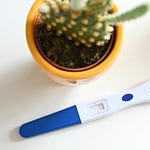
It’s Q&A time! You can ask your own question here for a chance to have it answered in an upcoming edition.
The first question is available to everyone (about IgG tests for food sensitivity), and there are three bonus ones for paid subscribers (about glyphosate in food, recent headlines about chemicals in baby wipes and tampons, and whether you really need to avoid dairy for acne).
These will be quicker answers than usual because I’m writing with painfully itchy and blistered fingers, having come down with a nasty case of hand, foot, and mouth disease…on top of the political chaos of the past few weeks and the other distractions I wrote about in my last essay. I just keep reminding myself that nothing lasts forever, and there will come a time when my hands no longer feel and look like they’ve been stung by a thousand fire ants. For now, there is ibuprofen!
Should I trust IgG tests? My functional doctor ordered one and it came back showing I was intolerant to all my favorite foods, but I remembered hearing one of your podcast guests say these tests were bogus.
FYI: my answers here are for educational and informational purposes only, aren’t a substitute for medical or mental-health advice, and don’t constitute a provider-patient relationship.
No, IgG tests are not accurate indicators of food allergies or sensitivities. These tests measure proteins in the blood called immunoglobulin G (IgG) antibodies, which most people have for the foods we eat regularly. IgG antibodies to a particular food don’t mean you have a sensitivity at all—they simply mean your body has been exposed to that food. In fact, IgG antibodies seem to be markers of food tolerance or desensitization.
That’s why IgG test results often show that people are “sensitive” to the very same foods they consume every day. Patients are left wondering what they’re allowed to eat now that all their favorite foods are supposedly off-limits—but actually, there’s no reason to change your diet at all. The test just doesn’t show what it claims to show.
For this reason, many evidence-based medical organizations (such as the American Academy of Allergy, Asthma & Immunology) caution against using IgG testing to diagnose food allergies, intolerances, or sensitivities. IgG testing is one of many dubious testing methods used in complementary and alternative medicine—though it’s unfortunately also sometimes used by credentialed MDs and dietitians, particularly those in the integrative and functional medicine fields. The episode you mention above is with Jonah Soolman, a registered dietitian who worked at an integrative-medicine clinic early in his career and administered IgG tests to his patients on the instruction of his bosses, who were integrative doctors. Increasingly, IgG tests are also available as part of the growing direct-to-consumer testing market, which I discussed here.
My recommendation to anyone whose provider orders an IgG test: if possible, get a second opinion from a medical doctor who doesn’t subscribe to integrative/functional medicine and can guide you on the appropriate evidence-based testing methods. Ideally this provider would also have some knowledge of disordered eating, since changing your diet to address genuine food allergies/intolerances or gut issues can be a major trigger.
Glyphosate in Food
I heard someone on a podcast recently talking about glyphosate [a widely used herbicide] and how bad it is for our health to have it sprayed on all our food, especially when it comes to cancer. Is this true?











